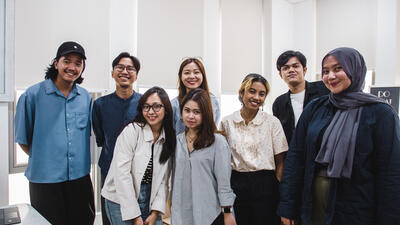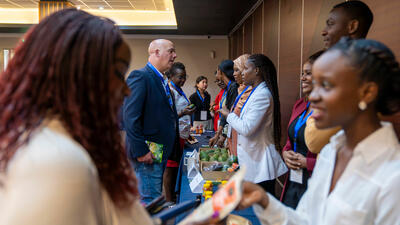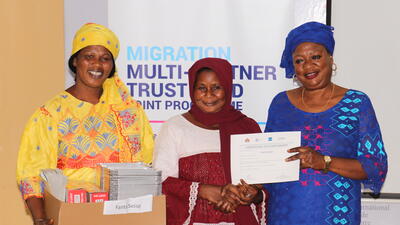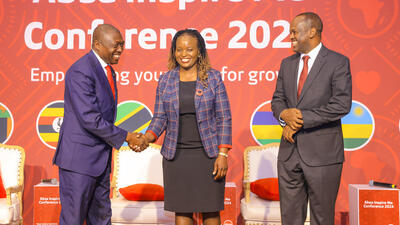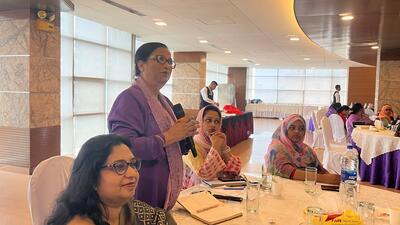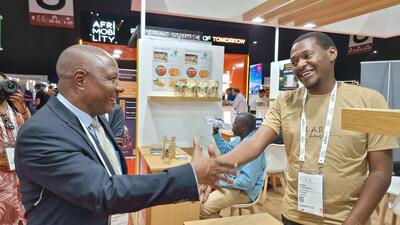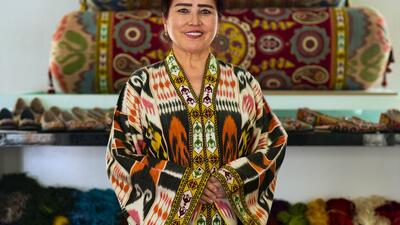Free trade needs free women
Kuli Mungombe owns and operates a fishing rig with nine other women in Zimbabwe. The group entered the male-dominated industry last year after being provided with the boat, equipment and training, and have doubled their sales. These women join millions of empowered women around the world who are powering trade and inclusive economic growth, and reducing inequality and poverty.
‘I used to sell fish under the trees and carry fish on my head,’ says Mungombe. ‘I would wake up at 4 a.m. to walk a long distance to buy fish from the fishermen. Now I sleep and wake up normal hours, and have my tea before the captain comes. I never thought I would have time to sleep, eat, work and rest like this!’
Advancing women’s economic empowerment is a priority for UN Women. It is the right thing to do from both a human rights and an economic perspective. The World Bank's 2012 World Development Report and 2012 report from the Organisation for Economic Co-operation and Development (OECD), Gender Equality in Education, Employment and Entrepreneurship, find that reducing the male-female employment gap has been an important driver of economic growth and that greater progress is needed to reduce persistent gender inequalities and discrimination, and to empower women.
For the Tonga fisherwomen in Zimbabwe, local support came through the Zubo Basilizwi Trust, a development organization that secured the fishing rig for the women traders in Siachilaba, supported by UN Women. The women are now working to organize into collectives, improve their market stands and conditions in Siachilaba, and market their fish to Zimbabwe’s larger towns and cities.
‘I grew up knowing that any meaningful business was a preserve for men, not for us women,’ says rig operator Sarudzai Mumpande. ‘We have since overcome those challenges because we have organized ourselves into a serious business entity.’ The women have also worked out a scheme for sharing their income so that it benefits other women. From their earnings, 50% will go to the female rig operators; 30% into a basket-weaving fund for women in the area; and 20% will be given to the Zubo Basilizwi Trust to expand the revolving fund for women in other areas. While many challenges still remain, the women are starting to believe and accept that they are champions of their own destinies. ‘Although I grew up here, I had never been to the harbour. I had no idea what it felt like to sail on the river,’ says rig operator Violet Mwinde. ‘I sold fish for years, but could not afford to eat the fish I sold. Now, our children come to visit during the holidays and have fish. My life has changed significantly.’
Between 1983 and 2008, 553 million women joined the global labour force, global trade grew 85% faster than GDP, and exports from developing countries grew 14% annually, according to the 2012 World Development Report. Expanding women’s empowerment through education, employment, skills and entrepreneurship is paying off and is widely recognized as an essential part of the solution to today’s economic and social challenges. There is mounting evidence from the World Bank, United Nations, OECD and others showing that increasing gender equality contributes to increased growth, productivity and competitiveness. Societies can draw on a more complete range of global talent and skills to strengthen their recovery from the global crisis. Innovation requires new and unique ideas and the best ideas flourish in a diverse environment.
While the gender gap in labour force participation has narrowed significantly, gender gaps in wages, opportunities, access to resources, education and career fields, and unpaid domestic work have only narrowed marginally. Men still make more money than women for the same jobs. Women continue to be under-represented in management and leadership positions and women continue to face discrimination in access to land, property, inheritance, finance and other productive assets. Girls are less likely to choose scientific and technological fields of study and take up a career in these fields. And women continue to do 58% of unpaid work and 60% to 80% of house and care work globally.
Moving forward, policies and laws are needed to advance equal rights and opportunities to make growth more inclusive and to reduce inequalities. By strengthening women’s economic role, economic recovery can be faster, deeper, more sustainable and fairer. Women put their income back into families and communities, driving down hunger, illiteracy and mortality rates, and increasing economic gains. Eliminating barriers that discriminate against women in certain sectors or occupations could increase labour productivity by up to 25% in some countries. The World Economic Forum reports that greater gender equality corresponds to higher per capita gross domestic product. The UN Food and Agriculture Organization finds that providing women farmers with the same access as men to seeds, tools and fertilizers could raise national agricultural output by up to 4% and reduce the number of hungry people by 100 million to 150 million.
UN Women is supporting countries to remove barriers that limit women’s full and equal economic participation, from providing training and skills to making laws, policies and conditions fair for women. We have initiated partnerships with many public organizations and the private sector. We partner with UN food-based agencies to advance the economic empowerment of rural women who produce nearly half the food in developing countries. We urge private companies to embrace the Women’s Empowerment Principles to strengthen equal opportunities and women’s leadership in the private sector. So far, more than 400 companies have committed to the principles.
In today’s world, information and communications technologies (ICTs) matter immensely for gender equality and the empowerment of women. They bring a means of economic development, offering new livelihood opportunities and productive capabilities. They can offer a host of benefits through improved access to services and they enable women to mobilize for their rights and engage politically through participation and advocacy channels. UN Women is already promoting ICTs in several countries for more inclusive governance and women’s political literacy.
UN Women continues to advocate for gender-responsive ICT policy. We have provided digital literacy training to rural women and ICT skill development for young women entering the workforce. We have also built awareness of national machineries on ICT so ministries for women and other national groups for gender equality can lobby for policies to be put in place that will benefit both women and girls. Through our Women’s Empowerment Principles we also encourage the private sector to attract, retain and promote women to the highest levels. By pushing for women to be present and active in the ICT sector today, we can provide girls with role models and mentors.
Across sectors and partnerships, UN Women is working to ensure adequate investments in gender equality. The aim is to counter gender stereotyping and increase women’s participation and leadership, prevent gender segregation of labour markets and maintain investments in social protection and social policies that enable women and men to reconcile work and family responsibilities. We are also working to strengthen institutions and support the reforms needed to secure fair and decent working conditions.
Today, women are often involved in informal trade that is unregulated. In southern Africa, for instance, it is estimated that 70% of informal cross-border trade is by women. In all regions, the 2012 World Development Report finds that gender gaps in education, women’s disproportionate care responsibility, weaker property rights and limited access to productive inputs limit women’s ability to benefit from trade openness.
At this time of continuing economic crisis, we have an opportunity to place increased policy focus on inclusiveness and equality. Free trade needs free women. To reach this, there are five policy options:
First, countries should increase and improve women’s employment options by increasing investments in education and skills training, easing the unpaid work burden of women through the use of childcare policies and by making investments in infrastructure and time and labour-saving technologies.
Second, countries should improve the quality of jobs and decent work through stronger enforcement of labour laws and regulations, as well as organizational adjustments in the workplace to advance equality.
Third, countries should reduce gender gaps in access to assets, inputs, technology, marketing networks and decision-making, and encourage producer cooperatives to support rural livelihoods and the income and export market engagement of women farmers.
Fourth, countries should advance social protection and universal access to basic income security guarantees and basic health services, primary education, housing, water, energy, sanitation and other essential services.
Fifth, countries should reform trade policy by undertaking gender impact studies, introducing gender-sensitive policies into trade negotiations and enforcing them effectively during the implementation of trade agreements.
It is important to highlight that gender equality policies must be situated within a coherent macroeconomic framework, an effective regulatory framework and a coherent set of initiatives at the international level so that empowered women can power trade and inclusive economic growth.




